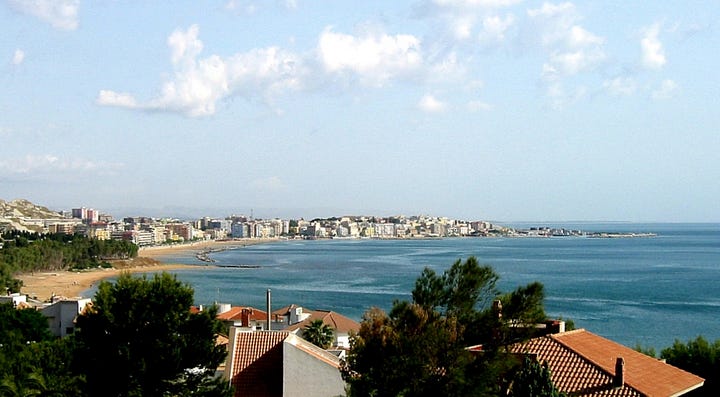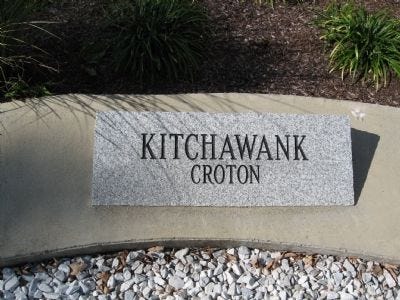Chronicle Survey: Should we villagers be called “Crotonites” or “Crotonians”? (Or maybe something else?) [Updated, again!]
Nobody seems to know why we are called "Crotonites." Can we change our name?
What’s in a name? Sometimes, a lot.
We know where the village of Croton-on-Hudson got its name, or at least we think we do. According to most histories of the area, the name “Croton” comes from the chief of the Kitchawanc tribe, Kenoten, which means “wild wind.” The Kitchawancs, part of the Wappinger Confederacy of the Algonquin Nation, occupied Croton Point and other nearby areas—at least until 1682, when they sold the point to Cornelius Van Bursum. By the 18th century, the point had been incorporated into Stephanus Van Cortlandt’s Cortlandt Manor estate.
Croton-on-Hudson was incorporated as a village in 1898. At some point, we began calling ourselves Crotonites, or someone else started calling us that.
Why? Nobody seems to know. We even asked Village Historian Marc Cheshire, figuring that if anyone knew, it would be him.
“No one knows,” he told us.
Now, since we are going to run a poll on this subject, we don’t want to bias the results from the beginning. But we do think that “Crotonites” is not a very elegant name for the people of this village. To us it sounds like some kind of bacterium or parasite. And Isaac Asimov fans will know that Crotonites also inhabit the fictional “Isaac’s Universe” that Asimov created. Here, according to Wikipedia, is the definition of Crotonites from that realm:
“A small winged species who live in an atmosphere poisonous to the other species, and who consider the other species inferior and look on them with contempt.”
Of course, Croton is a special place, but do we really want that kind of arrogant reputation, even by implication?
If we want to feel dignified and superior, there are other ways. For example, Croton was also the name of a Greek colony in Italy, founded in the late 8th Century BC. The Greeks called it Κρότων, and today it is a modern city called Crotone.


The people of ancient Croton were called Crotonians, or some Greek variation thereof. Like Croton-on-Hudson, ancient Croton was the home of many celebrities and star athletes, including Milo of Croton, Philippus of Croton, Cyclon of Croton, and many others.
You can probably see where we are going with this. Since no one knows why we are called Crotonites, and since as a free people we can call ourselves (and others) what we want, perhaps we should consider calling ourselves Crotonians instead?
Let’s vote on it. As always, Chronicle Surveys run for seven days, and anyone who is a subscriber—free or paid—can vote. And if you don’t like either of these choices, please feel free to suggest something else in the Comments.
We will report the results when the poll is over.
Update December 10: Long-time Croton resident Maria Cudequest, who publishes the Everything Croton blog, has come up with an early reference to the term “Crotonite” to describe us villagers. It concerns a short item in the May 26, 1928 Tarrytown Daily News about Holbrook Blinn, a famous stage actor who lived in Croton back in the day when the village was a major artistic colony. (See blowup below, taken from the bottom of the full page below that.)
According to his Wikipedia entry linked to above:
“Blinn died from complications of a fall off his horse near Journey's End, his Croton-on-Hudson, New York home, and is buried in Sleepy Hollow Cemetery in Sleepy Hollow, New York.”
We will continue to search for even earlier mentions of the term Crotonite, and of course we welcome help with that search!
Update December 15: Village historian Marc Cheshire has now found two references to villagers being called Crotonites, both in the August 18, 1894 edition of The Highland Democrat. So we realize we are really fighting historical precedent by wanting to change the name. The results of the survey will be announced tomorrow.
************************************************************************************************************
To share this post, or to share The Croton Chronicle, please click on these links.
Do you think we should be called something else other than the choices given above? Leave your thoughts in the comments.







Pythagoras had also lived in Crotone. Early-Pythagorean sects lived in Croton and throughout Magna Graecia. They espoused to a rigorous life of the intellect and strict rules on diet, clothing and behavior.
I will just add again, all this information is interesting and fun to compare and think about. The Native American history and Isaac's Universe. We really don’t think about the name of the village much or what people call us from Croton. I’m curious where the poll leads but I bet Crotonites wins easily. Not my favorite one.